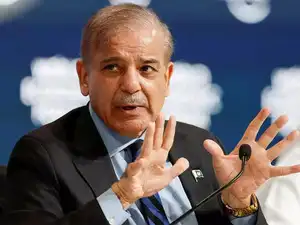 Reuters
ReutersAddressing the International Conference on Glaciers’ Preservation in Tajikistan’s capital Dushanbe, he said the world must recognise that water transcends political boundaries, connects communities and sustains ecosystems and cultures, demanding global action over India’s decision to put the Indus Waters Treaty in abeyance.
“We are now witnessing an alarming new low, the weaponisation of water. India’s unilateral and illegal decision to hold in abeyance the Indus Waters Treaty which governs the sharing of the Indus basin’s water is deeply regrettable,” Sharif said, adding that lives of millions of Pakistanis must not be held hostage to “narrow political gains”.
“Our waters and our glaciers... bind us in a shared destiny. Let us protect and preserve nature’s precious bounties for our planet and our peoples,” he further said.
The comments came a day after India’s external affairs ministry spokesperson Randhir Jaiswal said, “I would like to underline that any bilateral discussion on Jammu and Kashmir will only be about the vacation of illegally occupied Indian territory by Pakistan. As for the Indus Waters Treaty, it will remain in abeyance until Pakistan credibly and irrevocably abjures its support for cross-border terrorism. As the prime minister has said, and I would like to repeat his words, terror and talks cannot go together.”
Pakistan chose Tajikistan for raising the issue even as it is a strategic partner of India in Central Asia and had been involved in a trans-border water dispute with a neighbour in the past. Tajikistan and Kyrgyzstan’s decades-long border dispute, particularly over water access and land, has resulted in several violent clashes. An agreement in March this year resolved the final contested border, promising to end the long-standing tensions.
Tajikistan and Uzbekistan have a water treaty that addresses the management and protection of water resources, particularly in the Syr Darya and Amu Darya river basins. The treaty is part of a broader effort to manage shared water resources in Central Asia, including cooperation with other countries such as Kazakhstan, Kyrgyzstan and Turkmenistan.
On Thursday, during his meeting with the Tajik President Emomali Rahmon, Sharif also asked the international community to hold India accountable for what he alleged was “acts of war”, saying the region could not afford India’s “irresponsible and unlawful actions”. Rahmon, on his part, expressed concern over the recent India-Pakistan conflict but neither sought to mediate nor showed any solidarity with Pakistan’s views on Kashmir.
Read More News on
(Catch all the Business News, Breaking News, Budget 2025 Events and Latest News Updates on The Economic Times.)
Subscribe to The Economic Times Prime and read the ET ePaper online.



































